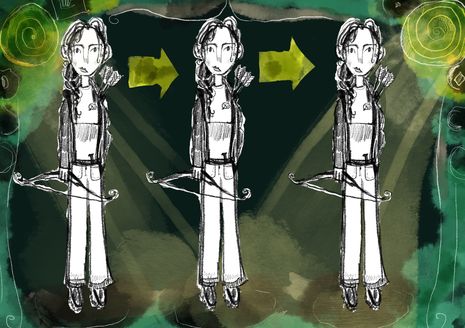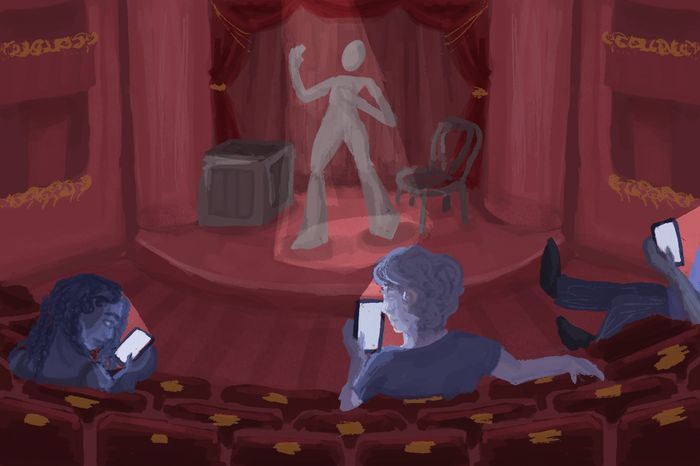Bread, circuses, and The Hunger Games on stage
Creative venture or cop-out? Shan Tan-Ya thinks film-to-stage adaptations are both

My Neighbour Totoro, The Devil wears Prada, Clueless, Percy Jackson: The Lightning Thief – not a random list of iconic films, but a selection of productions opening in 2024-25 on London’s West End. Film-to-stage adaptations are nothing new, but I was recently startled to see a particularly famous name added to this reaping: Suzanne Collins’s The Hunger Games: On Stage will premiere this October. For some reason, this struck me as being a step too far, and had me wondering whether theatre, historically so creative, had finally run out of content. Still, I questioned my instinctive outrage – was this an overreaction to a perfectly benign celebration of a beloved story?
Live theatre, perhaps more than any other medium, is founded on the premise that retelling is a worthy artistic goal in itself – what else explains this shared delusion that watching the same Shakespeare and Sophocles plays performed by different actors and costumes somehow constitutes a meaningfully different experience? At least six of the ten longest-running West End shows are directly inspired by pre-existing media, from romantic French novels (Phantom, Les Mis) to T.S Eliot’s feline-themed poetry (Cats). Productions which blatantly capitalise on the fame of their source material are often adored in their own right – Mozart’s The Marriage of Figaro is a pretty straightforward adaptation of an immensely popular Beaumarchais play which premiered a mere two years earlier. To keep the sponsors happy, Mozart watered down the original’s controversial political message, birthing a musical crowd-pleaser which has become a staple of the operatic canon. It just goes to show that today’s revered classics were often yesterday’s canny business propositions.
“A major franchise embarking on a lucrative theatrical run isn’t trying to introduce a challenging story to new audiences”
Yet it’s lately started to feel like there’s a relentless pipeline from pop culture IP to the stage, built from necessity after exhausting all other adaptation rights. It could be argued that going to see Frozen or Shrek the Musical is a harmless way of introducing young audiences to theatre, but it’s really just a way of introducing them to spectacle. I certainly understand the attraction – Hunger Games scenes like the reaping or the tribute parade will be wildly immersive on stage, and if I didn’t have principles, I would love to go and see it. However, at the best original shows I’ve seen, some here in Cambridge, the audience’s excitement runs far deeper than an adrenaline burst triggered by music or special effects – it comes from desperation to know what will happen next, wonder at hearing a specific feeling articulated for the first time, and curiosity about how the themes resonate with the outside world. In contrast, a major franchise embarking on a lucrative theatrical run isn’t trying to introduce a challenging story to new audiences, given how expensive tickets are, but to profit from veteran fans looking for familiar thrills.
Then there are the contradictions inherent to the Hunger Games on stage: like Hinge, the dating app designed to be deleted, I thought that Panem was intended as the dystopia to warn us off our most dystopian instincts – but the franchise continues to profit off audience’s unholy fascination with children fighting to the death 15 years after the first book came out. Even as a fan, when I first saw the show advertised on the Tube, I initially recoiled. The posters seemed to dangle the promises of glory and bloodshed that once drew thousands to the Colosseum. It’s only now that I’m realising that this may, disturbingly, be the point.
“The franchise continues to profit off audience’s unholy fascination with children fighting to the death”
For one thing, the production opens in Canary Wharf, probably the closest thing the UK has to a futuristic Capitol populated by out-of-touch elites. Secondly, the seating areas are arranged, charmingly, “by District”, with the best seats going to Districts 1 and 2 and lower Districts having worse views. Is this tactless revelling in the dystopian aesthetic, or a genius social commentary condemning the audience for coming? I suspect the producers (and audience) will be able to have it both ways – enjoying the extravaganza while acknowledging that the whole premise is suspect.
So, how can we know which film-to-stage adaptations are worthwhile, and which should have been discarded for something more original? The answer is subjective. I recently argued that the Dr Strangelove adaptation was timely given the current political climate. The director of last year’s puppet-heavy Spirited Away justified its theatrical reimagining by comparing it to children’s classics like Peter Pan and Alice in Wonderland. I, Daniel Blake, when transferred to the stage seven years after the film, surprised audiences with up-to-date quotes from contemporary politicians. And the musicals of Matilda and Mean Girls added enough catchy songs to go the full circle and become films again.
One thing seems certain: film-to-stage adaptations are everywhere. For shows trying to find success while pitching truly original content, it looks to be getting even harder to compete for the attention of audiences against this backdrop of more familiar titles. For the sake of us all, may the odds be ever in your favour.
 News / Judge Business School advisor resigns over Epstein and Andrew links18 February 2026
News / Judge Business School advisor resigns over Epstein and Andrew links18 February 2026 News / Gov grants £36m to Cambridge supercomputer17 February 2026
News / Gov grants £36m to Cambridge supercomputer17 February 2026 News / Union speakers condemn ‘hateful’ Katie Hopkins speech14 February 2026
News / Union speakers condemn ‘hateful’ Katie Hopkins speech14 February 2026 News / CUCA members attend Reform rally in London20 February 2026
News / CUCA members attend Reform rally in London20 February 2026 News / Right-wing billionaire Peter Thiel gives ‘antichrist’ lecture in Cambridge6 February 2026
News / Right-wing billionaire Peter Thiel gives ‘antichrist’ lecture in Cambridge6 February 2026










